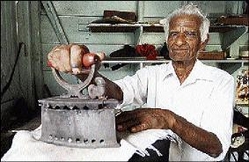
After more than 55 years of diligent toiling, Leonard Serju, a tailor from St Mary, still uses a coal iron and is proud of his trade. - Norman Grindley/Chief Photographer
Hidden away in the hills of St Mary is one of the last remaining Jamaican tailors of the 1950s, whose experiences and charitable contributions are as notable as his enduring years as a tradesman.
Among the notable accomplishments of this unassuming tailor is his claim to have made several pairs of pants for the first prime minister of Independent Jamaica, Sir Alexander Bustamante, and a number of other notable government officials of that era.
Leonard Serju, who has worked the majority of his life in his home parish of St Mary, says he had been employed to a tailoring establishment in Kingston in the late 1950s when he made a pair of pants that so pleased Bustamante it earned him a special tip.
"Him ask me if is I mek the pants. I tell him 'yes' and him take a pound and give me," Serju recalled with a smile.
Driven to do better
The pound went to buy food and pay his rent but, beyond that, Serju said it showed him respect and drove him to do better.
After more than 55 years of diligent toiling, Serju has one lesson to leave behind for Jamaica.
"No work is downgrading to any man," he told The Gleaner during a visit to his workshop in Richmond, St Mary.
Observing 77-year-old Serju slowly and methodically pressing a pair of black pants with his charcoal iron until he gleamed with sweat was enough evidence of the passion he holds for his trade.
Serju loves tailoring and explained that the only thing that affects his love for the craft is the economics of it - how at times it fails to meet his needs. Beyond that, however, it is his passion.
"Me love it in a way, but sometimes me have to go to the bush when there is nothing to do - I wudda love it better, but yuh know things is going down. Sometimes up, sometimes down, so I have to find different means," he shared.
Finances determined fate
Serju wanted to be a lawyer but, due to inadequate early education and the ill-timed death of his father, which forced the yoke of responsibility upon his shoulders early in life, he was forced to find a trade.
"Me fada die likkle before I went to trade. Mi fada died when I was 16. Mi madda say me must look a trade - and me say 'yes', but me want tailoring," he recounted.
The importance of having a trade has lived with Serju since that time and he still believes that having a trade is a sensible and viable option for young Jamaicans.
"Learn a trade if yuh don't have education. If you don't have a trade, learn farming - because farming is the key to everything," he said.
Helping the poor
Throughout the years, Serju has used his trade as a means of aiding the poor and indigent within his community.
"When people don't come back for them clothes, me give it to the poor," he shared. He claims to have given away up to eight pairs of pants at a time after customers failed to collect them over unreasonably long periods; for example, two or three years.
Myrtle Carter, who has been operating an embroidering business beside Serju's workshop for about three years, confirmed his charitable contributions to his community.
"He help them when they come to him, and they do not have any money, and they want a zip to stitch or something," Carter said.
"He help like schoolchildren going to school, they come to him with their pants and ask him to cut it and he cut it and hem it and give it to them."
andrew.wildes@gleanerjm.com